A‘ūdhu billāhi minash-shaitānir-rajīm.
I seek refuge in Allāh from the accursed satan.
Bismillāhir-Rahmānir-Rahīm.
In the name of Allāh, the Most Compassionate, the Most Merciful.
As-salāmu ‘alaikum wa rahmatullāhi wa barakātuhu!
Dear Brothers and Sisters,
May God always protect and watch over us.
The Mosque is now open. You can also join us at Fellowship Live: https://www.bmf.org/shoutcast/
In shā’Allāh:
The daily 4:30 a.m. dhikr as taught to us by our beloved Father Bawa Muhaiyaddeen (Ral.) will be played.
The prayers will be broadcast at the prescribed times.
May our hearts unite in worship and praise. May we strengthen our īmān and our love for God. Was-salātu wa salāmu `alā sayyidinā Muhammad, wa `alā ālihi wa sahbihi ajma`īn.
Āmīn, āmīn, āmīn, yā Rabbal-`ālamīn!
Welcome to the official site of the Mosque of Shaikh M. R. Bawa Muhaiyaddeen!
History of the Mosque
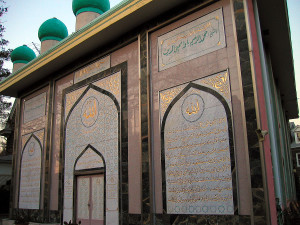
In May of 1984, barely six months after construction began, the exquisitely decorated Mosque of Shaikh M. R. Bawa Muhaiyaddeen officially opened, in a beautiful, moving dedication ceremony. The entire congregation recited the Sūratul- Fātihah, and the mu’adhdhin gave the call to prayer. In the discourse that follows, Shaikh M. R. Bawa Muhaiyaddeen[Ral.] reminds those present that unity is the noblest ideal in life. It is in this spirit of unity and love that this Mosque, built by the members of the Bawa Muhaiyaddeen Fellowship, is open for the five daily prayers (salāh), jum’ah prayers every Friday, as well as for the recitation of the early morning dhikr (the remembrance of God). We offer classes in Arabic, Qur’ān recitation, salāh, and introductory classes in Islām.
If you would like to donate online to the Mosque, please use our secure donation page.
The Opening of the Mosque of Shaikh M. R. Bawa Muhaiyaddeen
May 27, 1984
The salawāt, the Sūratul-Fātihah, and the Call to Prayer were recited outside in front of the Mosque. Then all went inside.
Sonia Gilbert’s father, Max Leon, Head of the Board of Trustees of the Bawa Muhaiyaddeen Fellowship:
This is a real gratifying experience to me because I was in the hospital recently and His Holiness Bawa is responsible probably for me being even here today altogether, because he had a private audience with God, and he prevailed upon Him to let me live.
And so here I am, and I want to tell you how happy I am to be here, to join all of you in the dedication of this beautiful Mosque. I hope that it brings happiness to all the people who are associated with this order, as much happiness as Guru Bawa, His Holiness, brought to my family, when we finally got together.
That’s about all I’ve got to say: I want to thank God for having a friend in my corner such as His Holiness Bawa.
Bawa Muhaiyaddeen[Ral.] to Mitch Gilbert:
Tambi, brother, are you going to speak?
Mitch Gilbert, President of the Bawa Muhaiyaddeen Fellowship:
Bawa has asked that I speak a few words. Bismillāhir-Rahmānir-Rahīm. In the name of that One who rules over everything and rules with that absolute mercy and perfect compassion.
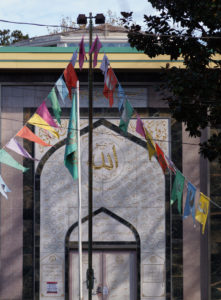
There is an incredible unity that has occurred within this Fellowship, and it is a unity that I don’t think we would have realized we had, were it not for all that transpired in these last several months of building this Mosque and now today officially opening it.
The unity that has occurred in this Fellowship is a unity that has nothing to do with what we see on the outside, and yet we had to have what we see on the outside to make us aware of the unity that exists on the inside. It is that perfect unity that occurs as each of us realizes one by one what those things are that do separate us, and recognizes them as the things that cause us to live in hell.
And as one by one we recognize the things that do separate us and we cast them aside as things that are hell, what remains is that perfect unity that is God, that place where nothing exists except God. And the God that each of us discovers within ourselves is that one God who encompasses us all.
Al-hamdu lillāh, all praise is to God. May we thank God that He exists within our hearts. May we thank that beautiful Teacher Bawa Muhaiyaddeen, who has done everything through all these years, both inside of us that we didn’t always know about and outside that we didn’t always understand, but nevertheless worked so tirelessly to bring us to this place where we could recognize that oneness of God within us all. Āmīn. Āmīn.
Bawa Muhaiyaddeen[Ral.]:
A‘ūdhu billāhi minash-shaitānir-rajīm. Bismillāhir-Rahmānir-Rahīm. I seek refuge in God from satan, the accursed. In the name of God, the Most Compassionate, the Most Merciful.
May all praise and glory be to Allāh, the Unfathomable Ruler of Grace, the One who is Incomparable Love, the One who bestows the undiminishing wealth of grace. May He bestow His good blessings and His rahmah, His grace, upon us. Āmīn. Āmīn.
God. None of us has seen God. Messengers such as Gabriel[A.S.] carried the messages between the prophets and God. It was through those messengers that the proof of God was revealed. Through them, ‘ilm, divine knowledge, and wisdom were sent down in various languages.
There was a language for every prophet. Gabriel[A.S.] descended and spoke the words of Allāh through those

languages. Adam[A.S.], Noah[A.S.], Abraham[A.S.], Ishmael[A.S.], Moses[A.S.], David[A.S.], Jesus[A.S.], and Muhammad Mustāfār-Rasūl[Sal.], Idris[A.S.], Isaac[A.S.], Job[A.S.], Jacob[A.S.], Jonah[A.S.], Joseph[A.S.], Salihu[A.S.], Solomon[A.S.], and all the twenty-five prophets [mentioned in the Qur’ān] were revealed by God. Of them, eight of those prophets were created with the most certitude, and revealed as His messengers. They were the messengers.
What is it that we have accepted from those languages? We have separated the religions. We have separated the languages. We have separated the prophets. These are the things we separate.
However, what Allāh poured forth from the pond of the rahmah was His rahmah. All of it was poured forth from the pond of truth known as His rahmah. He spoke to each prophet of the same rahmah. He gave each one the same water.
Even if it comes from the east, water is water. Do you see a separation? Even if it comes from the west, the water we drink is water. Do you see a separation? Even if it comes from the north, water is water. Do you see a separation? Even if it comes from the south, it is water.
We use fresh water with the same tongue, the same mouth. The water from the ocean that exists in the east, the ocean that exists in the west, and the oceans that exist in the north and the south is the same. Can we use it? No. We use fresh water.
God’s truth is like this. The same thing was sent down to each prophet. The revelations came to all the prophets, step by step, one by one, one by one, one by one, higher and higher and higher. Each one climbed higher. We have to climb up from the base of the tree until we can pick the fruit. It is only then that we can eat the fruit. Can we do this by standing at the base of the tree? No. We have to climb up to where the fruits grow.
It is like this for the taste of the liberation of the soul in our lives: we have to climb in order to obtain the rahmah of Allāh. For this, we have to climb up each step. We must go from ādi, the beginning, to the arwāh, the world of pure souls—we must climb the steps.
As we drink from each section, the taste is one. On the tongue, the taste that we never tire of is God’s grace. God’s words, God’s grace, God’s blessing—we never tire of them. Any food that we partake of for a few days in a row will become distasteful to us. This grace is the only thing that will not become distasteful. And water, fresh water, never becomes repulsive. It never becomes repulsive to even the goats or the cows. If we go to drink any other kind of water, it will become repulsive in a few days, and we will stop drinking it. But we will never stop drinking fresh water. It is like this in the bahr, the ocean known as ‘ilm that God has shown us—that ‘ilm, that wisdom will never become distasteful. The taste remains the same. As it touches each tongue, the taste is the same. It is a taste without any distaste. That taste is the same to everyone. The more they taste and taste it, the more tastes there are. Like this, ‘ilm is one, wisdom is one, God is one, the family of humankind is one, and we are all of one lineage.
It is our separations that cause us to be divided. Our separations and our differences divide us and cause us to commit murders. What is becoming predominant at this time are murders, atrocities, and killings.
If one person says, “I am a certain religion,” that religion attacks another religion. It kills the person in the other religion, and it kills him as well. It attacks the next religion, but it also kills him. It also kills him. As he attacks the next and the next, he kills those of his own religion as well. The religions act like this. Is there any good that comes of it?
Let us think of what the religions say about certain things. Every religion says a Messiah is coming, another prophet will come, or a Messiah will come. That is what they say. Each religion has been saying that.
Who is the Messiah? That is what we must know. He who knows the truth that is inside human beings is a Messiah. We think the Messiah will come and give us heaven, but in the meantime, ‘Izrā’īl[A.S.], the Angel of Death will come. Death will come. Each one of us will die. Where will the Messiah come from? Death will come before he comes. We have been speaking about the Messiah for two hundred million years. Everyone who has spoken of that for the last two hundred million years has died. They are dead. He has not come yet, but we are still thinking about it.
The Messiah is unity, love, harmony, high ideals, compassion, equality, peace, tranquility, the belief in one God, the belief that God is One, that we are one family, that we are all in unity as brothers and sisters, that there is only One who is worthy of worship, that other than Him there is no other God, and that He is Most Great.
All of us must gather together and immerse ourselves in the pond known as the rahmah, we must bathe there—we must swim and bathe in the bahrul-‘ilm, the ocean of divine knowledge. That which leaps and dives into Allāh—that one word—and disappears into it is the Messiah. That is what becomes the Messiah for us.
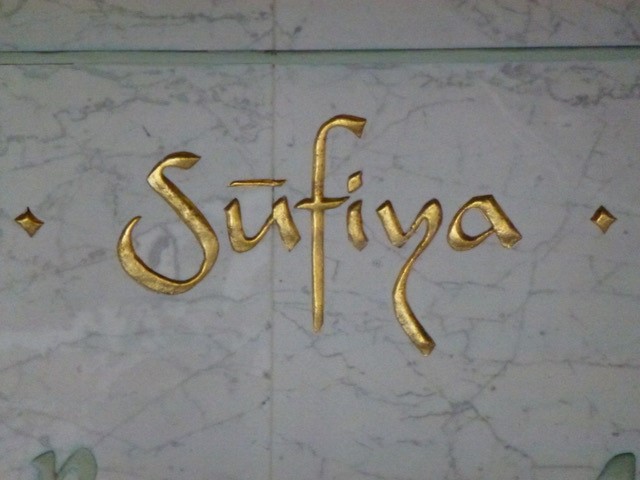
The one who can do this is the Messiah. The one who can create unity is the Messiah. The one who can beautify their qalbs, their inner hearts, is the Messiah. The one who can dispel poverty and difficulty and bring everyone together in unity is the Messiah. The one who can dispel evil qualities and bring forth and offer good qualities is the Messiah. The one who can remove all the evil divisions and create unity, the one who makes us one family is the Messiah.
All of us must gather together and immerse ourselves in the pond known as the rahmah, we must bathe there—we must swim and bathe in the bahrul-‘ilm, the ocean of divine knowledge. That which leaps and dives into Allāh—that one word—and disappears into it is the Messiah. That is what becomes the Messiah for us.
The one who can do this is the Messiah. The one who can create unity is the Messiah. The one who can beautify their qalbs, their inner hearts, is the Messiah. The one who can dispel poverty and difficulty and bring everyone together in unity is the Messiah. The one who can dispel evil qualities and bring forth and offer good qualities is the Messiah. The one who can remove all the evil divisions and create unity, the one who makes us one family is the Messiah.
There are four hundred trillion, ten thousand spiritual divisions in our lives, so many. The one who can mend those divisions, reveal the one family, the family of mankind, our one lineage, and make us one is the Messiah. The one who establishes the connection between God and humankind, the one who reveals that there is one truth, the one who reveals God in that one truth, the one who reveals the human being within God is the Messiah.
It is like this, jeweled lights of my eyes, precious jeweled lights within my eyes, that we must think of these things. My brothers and sisters, my granddaughters and sons, sons and daughters, precious jeweled lights of my eyes, never look at anyone as separate from yourself.
We must never see separation. We must never see anyone as different. We must open our qalbs and look through our beautiful qualities. Then we will see those qalbs as our own qalbs. We will understand the qalbs of others as our own.
If darkness looks at darkness, there will be darkness. If light looks at light, there will be light. If purity looks at purity, there will be beauty. Like this, we see our own faults in others as their faults. Therefore, when we become pure and dispel our own faults, we will not see the faults of others. They will be pure. Therefore, we must dispel our ignorance and bring out our wisdom correctly.
For both the dunyā, the world, and the ākhirah, the kingdom of God, it is this indivisible state that belongs to us. We are indivisible in the dunyā, one family. We will be indivisible in the ākhirah, one family. We have not left Allāh in the dunyā, we have not changed. We will not leave Allāh in the ākhirah, we will not change. We will continue to be one family. Each child must think of this truth.
Each religion has come as a religion. There are such things as religions. We must climb them step by step. There is a section above them, where the fruit is eaten. It is when we climb up each step, one by one, that we can eat the fruit. But as long as we are divided, we cannot obtain the truth.
We are only saying one thing: unity is the most exalted path in our lives. For this, we must eat from the same plate. We
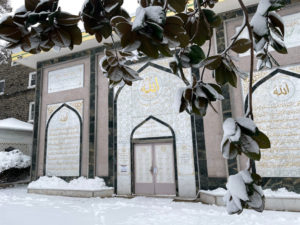
must trust other lives as our own life. The sorrows of others must be like our own. This has been told to the prophets, and the prophets have said and revealed this. This is what we must do. We must realize that the hunger of others is like our own hunger, and share what we have.
We must trust others as we trust ourselves. We must give up making them suffer, and give them peace. This must be our life. The benefit of doing these things in our lives is a great treasure. The qudrah, the Power of God, is within it. Toluhay, prayer, ‘ibādah, service to God, worship, dhikr, the remembrance of God, and fikr, the deep contemplation of God, must be performed in this state. It is in this state that we must become one.
There is a meaning for the word toluhay. Look! Here is the mihrāb, the niche in the wall of the Mosque, that indicates the direction of the Ka‘bah. When we say mihrāb, we are referring to a battleground, a place of combat. It is a place for war.
Are we coming here for war? Who is the enemy here? Who is the opponent? We have come to pray to God. We have not brought guns, machetes, or swords, but the mihrāb is a place of war.
What is the war? It is the battle within the self, against the self. The mihrāb is the place in each person where this war occurs. The war we must wage is to cut off the ignorance in ourselves; to kill our anger, our sins, our divisions.
Having killed them, what must we do here? We come for the five waqts, the five times of prayer, in order to transform our enmities; to transform our angers and our divisions; to transform our vengeance; to transform our backbiting; to transform our lying. To transform these things is our work; to transform our anger, our need to cause pain, and our vengeance.
This is the war we come here for. This is the place in which we wage war against the self—not others. This is the place in which each person must fight against the self. When we come to pray in this place, there is the prayer, but what is the meaning of it? It is a place in which to wage war; to chase out the ignorance and stupidity within ourselves; to cut off the divisions and separations; to destroy that which is the “I” and the “you;” to establish equality, tranquility, and serenity.
The work we must do in coming here is to establish these things. The name of it is prayer. We call it prayer, toluhay. For some it is tollay, a difficulty. For others it is toluhay, prayer. For some it is a tollay. “What is this for? We have to bow, we have to stand! What for?” This is what some say. For some it is toluhay, for others it is tollay.
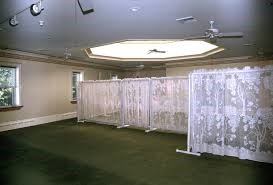
But it is to destroy that which is tollay, the difficulty, that we have the toluhay, the prayer. We come here for prayer in order to destroy the difficulties that have caught hold of us. The meaning of prayer is to embrace bosom to bosom; to clasp each other in an embrace; to embrace shoulder to shoulder; to look into each other’s faces. Through doing that our grievances will be dispelled, our vindictiveness will be dispelled, and our sins will be decreased. Everyone who prays must do this: men with men and women with women. This cuts the enmity. If we have been hit after ‘asr, the afternoon prayer, the grievance must be cut at maghrib, the evening prayer, the next waqt of prayer.
The objective of toluhay is to create this unity. The objective of prayer is to develop unity. To reveal the objective—to live as one family—God has given it the name toluhay, prayer. Toluhay came to create unity. Toluhay is the means by which unity is created. What is the meaning of toluhay? Our unity.
This is a place where everyone becomes one. Toluhay is what brings everyone together to live as one in one place. The work we do in order to achieve this state is unity. This is the work we do. From this we climb and climb and climb—there are four more steps to go.
Creating this unity is sharī‘ah. Then from there, to learn ‘ilm and wisdom is tarīqah. Then from there, to connect qalb to qalb, to join life to life, is haqīqah. Then from there, to merge soul to soul and become one, to take the form in which we can see God within ourselves, to take the Light-form is ma‘rifah. Sharī‘ah, tarīqah, haqīqah, and ma‘rifah[1] are like this. It is only in this state that we and God have a connection. To do the forty-three thousand, two hundred forty-eight sajdahs, prostrations, a day, to do them with God, is Sūfiyyah. That is Sūfiyyah, for the Sufis. To do this with every breath is Sūfiyyah. A Sufi’s life is with God.
Like this, the reason we do all these things is to create unity, to cut enmity, to cut the wars, to cut the divisions, to cut the separations, and to create peace. This is one reason for toluhay. God has decreed the prayers to show us the reason. It is a way to cut off our divisions. It is a way to destroy fighting. It is a way to cut away sins. The objective of prayer is to create this state.
The name of this place is Islām. It is called Islām. Lām[2] is Light. To stop the desires and to see that loving place—that purity is Islām. That is the name God has given to purity. But we do not really know what that name is.
It is more important to discover who we are. Who are we? Are we now human or animal? We must see whether we are
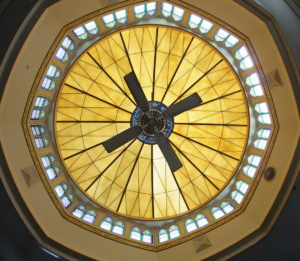
humans or animals. The most important knowledge is for me to know my own actions. We must learn, we must change, and we must become human. We must change and help humankind. The most important thing in our lives is to help others like that—to serve among them, doing service and duty, doing God’s duty among them and succeeding. We must think of this.
Division is not our life. Equality, peace, and tranquility are our life. These are the words, the actions, and the deeds that Rasūl[Sal.] brought. If all of us had accepted them and acted accordingly, today there would be no wars, no divisions, no differences, no religious troubles, and no destruction. Every child is a child of Adam[A.S.], through the lineage of Abraham[A.S.], in the ummah, the community, of Muhammad[Sal.]; there is only one God.
Moses[A.S.] came to free us from slavery, to free one man from having to be a slave to another. But man is still a slave. The prerequisite was to free one man from being a slave to another. How much difficulty came to the Nabī, the Prophet[Sal.] who came to give us freedom! How much difficulty Moses[A.S.] experienced! That is what it was like.
How many kinds of slavery man is subject to! He is a slave to each thought, to four hundred trillion, ten thousand thoughts: to desire, to attachment, to the earth, to gold, to wealth, to goats, to cattle, to horses, to asses, to land, to property, to happiness, to titles, and to honors. He is a slave to everything. There is no relief, no freedom. No freedom! He is a slave without any freedom.
We pray to gain our freedom. That is why we pray, why we do dhikr, why we worship, why we do ‘ibādah. This is our way.
He who does that correctly in this way, he who creates unity is the Messiah. He is the Messiah who has come for this time. He who gives us freedom before death is the Messiah. He who dispels our sadness is the Messiah. He who dispels the difficulties of the dunyā, he who drives out and dispels the demons and the devils of the dunyā that have caught hold of us is the Messiah. He is the Messiah.
Therefore, if all of you change and become the Messiah, if you follow that path, not even one sorrow will come to the world. It is then that the Messiah is here. God will come here. God and His divine kingdom will come here. Paradise will be here for us. Firdaus, heaven, will come here. The eight heavens will come here. They are within us. If we open them, we will be in paradise. Hell and heaven are in our hands. God and shaitān are within us. One side is shaitān, the other side is God. One side is hell, the other side is heaven. One side is true, the other side is false. One side is compassion, the other side is hatred and enmity. All of them—there are so many like this.
We must think of and look at each one, jeweled lights of my eyes. Precious jeweled lights of my eyes! O creations born with me as the life within my life! Each child! We must think of this. We must think and act accordingly, and in each thing we do know that unity is best. Love is best. Harmony is best. The highest ideals are the best.
We must have good conduct, we must worship, pray, and do ‘ibādah and dhikr. In doing them, we must act in the appropriate manner, with the appropriate integrity, with the appropriate truth. Each child must accept this. You must truly open your qalbs and act accordingly. Begging your forgiveness, in a humble and respectful way, I am pleading with you to do this.
May Allāh and Rasūl[Sal.] help us with our intentions. Just as God protected all the prophets, may we be saved from hell with His grace. Just as God blessed all the prophets, may we be protected from the difficulties of the dunyā. Āmīn.
May all the sorrows and sadnesses in the heart of each child be dispelled. May they be given peace, tranquility, and God’s love. May He make each qalb into a light. May He make the īmān in those qalbs strong. May He make those hearts pure. May He secure their connection to God. Āmīn. Āmīn.
May He forgive all our sins, the sins we have committed knowingly and unknowingly, the sins we have committed with understanding and without understanding. May He forgive us and have patience with us.
O God, O Rahmān, may You bestow Your good blessings upon us. May You give us the blessings of Your three thousand gracious qualities. May You forgive us. May You forgive all our many sins, lift us up, and hold us in Your hand. May You gather me and my children into Your eternal kingdom. O God, al-hamdu lillāh, all praise is to You. Yā Rabbal-‘ālamīn, O Ruler of the universes, yā Allāh, may You hold me and each one of my children in Your hand. May You accept the responsibility for each qalb. Protect us. My children must grow through Your blessings.
May You bless them so that my children progress according to the words and actions of Your prophets. Give them success in all ways. In their lives, in the ākhirah, in the dunyā, always, make their lives long and dispel their illnesses. Make their lives long.
Give them ‘ilm, wisdom, and compassion. Protect them and give them Your grace. Āmīn. Grant them lives without illness. Grant them undiminishing wealth. Destroy their ignorance. Bless my children with wisdom, serenity, Your love, and Your grace.
In this world and the next, in death and in life, dispel the pains of death. In the dunyā and the ākhirah, dispel their sorrows and transform their difficulties into good things with Your grace. Bless them so they always live in freedom.
Al-hamdu lillāh. O Rahmān, O One of all praise and glory, please have patience with us. Āmīn. Āmīn. As-salāmu ‘alaikum wa rahmatullāhi wa barakātahu. May the peace, the beneficence, and the blessings of God be upon you.
The congregation, responding:
Wa ‘alaikumus-salām. And may the peace of God be upon you too.
Bawa Muhaiyaddeen[Ral.]:
Jeweled lights of my eyes, because I am having a little difficulty breathing, I will stop here. Children who recite, children who pray, children who have come from a distance—please do what needs to be done. The children who speak, please speak. The children who recite, please recite. Tambi (Max Leon) and I must go. I am a little tired and he is a little tired. We must go.
The salawāt is recited by everyone...
[1] sharī‘ah, tarīqah, haqīqah, and ma‘rifah (Arabic n.) The four steps of spiritual ascendance.
[2] lām (Arabic, n.) The Arabic letter “l” which stands for the Nūr, the Light of wisdom
